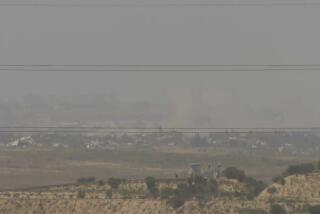NATO Forces Seize Serb Transmitters in Bosnia
- Share via
VIENNA — In a new show of force aimed at salvaging peace in Bosnia, hundreds of U.S.-led NATO troops and Russian soldiers seized four key Bosnian Serb television transmitters Wednesday and knocked hard-liners off the air.
The transmitting stations, which broadcast to more than half of the Bosnian Serbs’ territory, were handed over to the Western-backed Bosnian Serb president, Biljana Plavsic, NATO officials said.
The crackdown punishes Bosnian Serbs loyal to war crimes suspect Radovan Karadzic who have used the airwaves to portray NATO as a Nazi-like occupying force and to attack the 1995 peace accords brokered in Dayton, Ohio, that ended Bosnia’s 3 1/2-year war.
NATO’s “action demonstrates our determination to support those who support Dayton and to react swiftly and robustly against those who seek to obstruct the peace process,” Javier Solana, secretary-general of the North Atlantic Treaty Organization, told reporters.
Solana was speaking in Maastricht, Netherlands, where NATO ministers are gathered for an annual assembly and are discussing the future of the more than 30,000-strong international peacekeeping mission in Bosnia-Herzegovina, which includes about 8,000 U.S. troops.
In Bosnia, NATO armored vehicles blocked roads to the transmitting towers while helicopters buzzed overhead. No violence was reported in the early morning raids, which involved hundreds of heavily armed troops. Russian troops for the first time joined in a mission against the Serbs, their traditional allies and fellow Orthodox adherents.
By late Wednesday afternoon, Plavsic’s Banja Luka TV transmissions were being broadcast from the NATO-controlled towers.
Diplomats in Sarajevo said the final straw triggering the raids was Bosnian Serb TV’s distortion of a news conference last week by Louise Arbour, the chief prosecutor of the international war crimes tribunal, which has twice indicted Karadzic on genocide charges.
Bosnian Serb television, known as SRT, edited Arbour’s comments and inserted new words to portray the tribunal as an anti-Serb “political instrument,” Western officials said. Even journalists’ questions were distorted.
“We were extremely angered, and Judge Arbour was personally insulted and aggrieved,” said a United Nations official in Sarajevo.
While that anger appeared real, U.S. and some European officials have for some time been waiting for a pretext to step in against Bosnian Serb hard-liners.
U.S. officials in particular were embarrassed over an incident last month, when U.S. troops seized a Bosnian Serb transmitter under similar circumstances but then relinquished it to Karadzic supporters when the GIs were challenged by a rowdy mob.
U.S. Army Gen. Wesley Clark, the NATO commander for Europe, ordered Wednesday’s raids after a meeting Tuesday in Washington with senior U.S. officials, Western sources in Sarajevo said.
NATO’s military officers have at times been reluctant to appear to be siding with one faction in the Balkans, but Clark was persuaded that refusing to act now would be seen as backing down again to an egregious Bosnian Serb violation, the sources said.
The operation was launched even though SRT issued an apology Tuesday night and broadcast an unedited version of Arbour’s news conference. That concession was too little, too late, international officials said.
Over the past five months, NATO forces have taken new steps that expanded their role in Bosnian peacekeeping. U.S. officials make no secret of their support for Plavsic as a way to marginalize Karadzic.
In July, British NATO troops for the first time hunted and arrested an indicted war crimes suspect and killed another who allegedly resisted arrest. Soon afterward, NATO seized police stations to help Plavsic install officers loyal to her faction.
But debate raged over how to bring the often vitriolic language on Bosnian Serb television into line.
Under the Dayton accords, all parties, including the Serbs, have agreed to refrain from broadcasts that incite violence and racial hatred.
International officials say SRT routinely flaunts those guidelines, but some diplomats were queasy at using strong-arm tactics, such as jamming transmissions or occupying television and radio studios.
Now, however, Western officials are aware that failure to act against violations is undermining the peace accords. With scarcely eight months left before the current peacekeeping mandate ends, these officials are eager to salvage the progress made thus far and build on it to create stable governing institutions.
For U.S. officials, especially, the question of a follow-up force after the June expiration is a politically sensitive one. U.S. troops have been kept in Bosnia a year longer than President Clinton originally promised. Yet there is a growing consensus among diplomats that if all international military presence evaporates, peace may not last.
More to Read
Sign up for Essential California
The most important California stories and recommendations in your inbox every morning.
You may occasionally receive promotional content from the Los Angeles Times.














